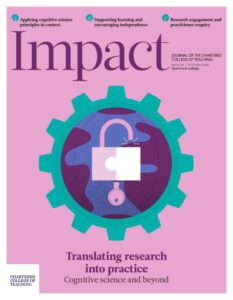Laura A Outhwaite, Centre for Education Policy and Equalising Opportunities, IOE, UCL’s Faculty of Education and Society, UK
Erica Ranzato, Psychology and Human Development, IOE, UCL’s Faculty of Education and Society, UK
Jo Van Herwegen, Psychology and Human Development and Centre for Education Policy and Equalising Opportunities, IOE, UCL’s Faculty of Education and Society, UK
In the United Kingdom, mathematical underachievement affects 20 per cent of children (DfEDepartment for Education - a ministerial department responsible for children’s services and education in England, 2017). Developing strong early mathematical skills is essential for children’s later educational success, as well as their future employment opportunities and mental and physical health outcomes (Butterworth et al., 2011). Estimates suggest that children’s maths attainment has been significantly impacted by the disruptions caused by COVID-19, much more so than reading (DfE, 2022). This reflects trends already visible in data prior to the pandemic, where a maths–reading attainment gap emerges in the first years of primary school, with reading skills significantly exceeding those of mathematics (Outhwaite, Anders and Van Herwegen, 2022). This discrepancy in the development of mathematics and reading may be related to the increased focus on early reading and language skills in educational policy, classroom practice and the home learning environment. This article summarises recent advancements in research on mathematical development, and specifically how it applies to these three key areas of influence.
Educational policy
In England, during the first year of school, referred to as Reception or the Early Years, schools determine their own curricula. There is little guidance on what children should be taught beyond the early learning goals (ELGs), which describe what children should be expected to achieve at the end of the academic year. The ELGs have recently been changed to include an emphasis on children’s depth of knowledge in relation to recognising and understanding numbers, number relations, quantity and patterns (DfE, 2020). This may be reflective of the underpinning role of domain-specific number skills on later mathematical development, such as understanding the composition of numbers to 10 and being able to subitise (i.e. recognise quantities without counting) up to four or five items (Gilmore et al., 2018).
However, well-rounded mathematical development includes several interrelated but independent skills, which include both number and spatial skills (Hawes et al., 2019). Spatial skills are involved when using spatial language, visualisation, maps, diagrams and graphs (Farran, 2019). A recent meta-analysisA quantitative study design used to systematically assess the results of multiple studies in order to draw conclusions about that body of research found that interventions that encourage the development of spatial skills have a significant impact on children’s mathematical outcomes (Hawes et al., 2022). Therefore, it is vital that children have early mathematical experiences that encompass a broad range of mathematics-related skills. Although the shape, space and measure content is still included in the broader Early Years Foundation Stage (EYFS) curriculum recommendations (DfE, 2020), there have been concerns that its removal from assessment targets in September 2021 may lead to a narrowing of the taught curriculum. While the new EYFS framework has been piloted with 24 schools, with some qualitative positive feedback, largely focused on ease of implementation (Husain et al., 2019), the full impact of these policy changes and how they are effectively implemented by teachers is yet to be evaluated.
Classroom practice
A challenge in the context of the EYFS reforms in England is that many Early Years teachers report a lack of training in mathematical development (von Spreckelsen et al., 2019). They also report a high prevalence of mathematical-related anxieties (Gilligan-Lee et al., 2022), which have been linked to underachievement in children (Beilock et al., 2010) and less frequent implementation of maths activities, compared to literacy (Costa et al., 2021). Evidence suggests that mathematics activities that are implemented in the Early Years classroom are typically focused on counting and cardinality, rather than more advanced components, such as sequences (von Spreckelsen et al., 2019), and are typically formal in nature, rather than taking informal approaches, such as play-based learning (Costa et al., 2021).
However, a recent systematic review found that guided play, also known as play-based learning, had a greater effect on children’s early number skills and shape knowledge compared to direct instructionA method of instruction in which concepts or skills are taught using explicit teaching techniques, such as demonstrations or lectures, and are practised until fully understood by each student and free play (Skene et al., 2022). This reflects recent guidance from the Education Endowment Foundation on improving mathematics in the first three years of formal education, which called for more dedicated time for purposeful mathematics learning activities and the integration of mathematics in other learning activities throughout the school day (Clark et al., 2020) – for example, using concrete manipulatives and mathematical storybooks in the classroom, and integrating mathematical concepts into playful, everyday experiences. Recent systematic reviews have also demonstrated the benefits of educational maths apps to support learning in school and at home (Outhwaite, Early et al., 2022).
Home learning environment
The home learning environment (referred to as the home maths/numeracy environment when focused on mathematical learning) encompasses direct factors, such as available resources, activities and the child’s attitude towards maths, as well as indirect factors, such as family characteristics, quality of the interactions, parental beliefs, levels of confidence and expectations towards maths. It offers a unique platform to support children’s early mathematical development and is an important factor in predicting young children’s later outcomes (Mutaf-Yildiz et al., 2020). For example, the frequency of informal maths activities at home between parents and their children, such as playing cards, board games and applying maths concepts to everyday activities like cooking and shopping, has been shown to be associated with children’s later maths outcomes at school (Zhang et al., 2020).
However, research shows that parents’ engagement is lower in mathematics compared with literacy activities at home. For example, parents in England typically read to young children on five to seven days a week, which was significantly related to emergent literacy outcomes. In contrast, parents reported engaging in mathematics-related activities at home only once a week. Children whose parents engaged in more frequent home-based mathematics activities had stronger mathematical outcomes after accounting for socio-economic status (OECD, 2020).
In the recent schools white paper, the UK government outlined their ‘Parent Pledge’ as a strategy to help raise attainment (DfE, 2022). However, research also shows that to maximise the benefits of the home learning environment, it is vital that a multifaceted approach is adopted that extends beyond parent–school communication alone (Eason et al., 2020). This is particularly relevant when there are sources of inequalities in opportunities for active parental engagement. For example, research shows that children of graduate parents have higher educational outcomes, including in maths, compared to their peers whose parents did not go to university or have no qualifications (Sullivan et al., 2013). This can be explained by higher family income and increased investments in educational resources in the home (Macmillan and Tominey, 2019). Parents may also hold their own maths anxieties, and research shows that well-meaning home engagement combined with parental mathematics anxiety is negatively related to children’s mathematical outcomes (Maloney et al., 2015).
As such, it is vital that interventions designed to support the home learning environment are grounded in evidence about how children learn maths, and they should be accessible, scaled in equitable ways and, ideally, co-created with the end-users (Ranzato et al., 2021). Research shows that parent-based educational apps that provide parents/caregivers with accessible ideas for engaging with their young child’s mathematical development at home had positive and sustained benefits on child outcomes (Schaeffer et al., 2018). National campaigns to increase awareness, knowledge and confidence in early maths would also be beneficial, such as those similar to the DfE Hungry Little Minds campaign for early literacy in 2019 (Outhwaite and Van Herwegen, 2022).
Conclusion
Strong mathematical skills play a crucial role in children’s educational, economic, social and health outcomes (Butterworth et al., 2011), and raising maths attainment at primary school has been highlighted as a UK government priority (DfE, 2022). Changes in educational policy in the EYFS may enhance young children’s early number skills, but it is vital that this is not at the expense of well-rounded mathematical development, which also includes spatial skills. Likewise, although high-quality formal and informal maths activities at school and at home play a vital role in children’s learning and development, there are challenges that need to be addressed. These include teachers and parents’ awareness, knowledge and confidence surrounding early mathematics. These issues should remain an important priority for policymakers seeking to narrow the achievement gap between advantaged and disadvantaged children, starting from an early age.











